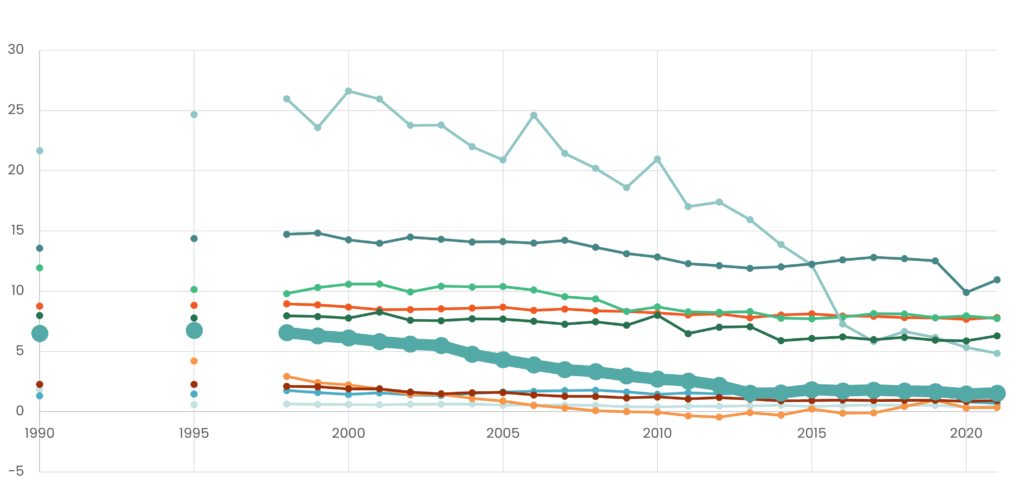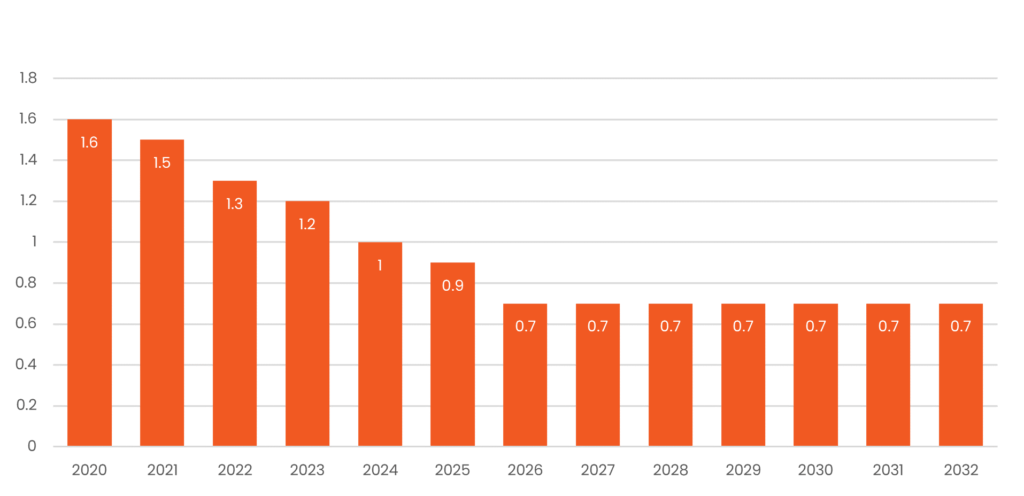Waste and the circular economy
Emissions from the waste sector cover emissions from waste disposed to landfill sites and the treatment of wastewater.
Read this chapter
Scotland’s territorial emissions 1990-2021

Emissions in MtCO2e from the waste sector 1990-2021, showing a fall of 76% (bold teal line)
The official figures for emissions from the waste sector look impressive with a 76% fall since 1990. This is in large part because methane which used to simply escape from active and closed landfill sites is now captured to make electricity. But the figures are misleading because emissions from incinerating waste are not included, despite much of the emissions coming from fossil-fuel-based plastic.
Including our demand for goods from overseas, our total climate footprint, or consumption emissions, only reduced by about 24% between 1998 and 2019, and our total carbon footprint is about 70% larger than our territorial emissions.218
A recent report from Zero Waste Scotland found:219
- only 1.3% of the resources Scotland uses are cycled back into the economy, with over 98% of Scotland’s material use coming from virgin resources
- Scotland’s per capita material footprint is 21.7 tonnes, nearly double the global average of 11.9 tonnes.
- high consumption and extraction of materials tie into a similarly large consumption-based carbon footprint of 75MtCO2e.
This means that consumption in Scotland is unsustainably high. This is, in part, due to the quantity of things we buy – but also due to the way we operate as a society.
The Scottish Deposit Return Scheme, supported by many SCCS members, would have reduced carbon emissions by 4MtCO2 over 25 years.220 The delay to the scheme and exclusion of glass is regrettable.
Scotland’s Carbon Footprint: 1998-2019, Scottish Government, 2023, https://www.gov.scot/news/scotlands-carbon-footprint-1998-2019/
The Circularity Gap Report, Zero Waste Scotland, 2023, https://www.zerowastescotland.org.uk/resources/circularity-gap-report
DRS – the benefits, Zero Waste Scotland, https://www.zerowastescotland.org.uk/resources/deposit-return-scheme-environmentalbenefits
The Climate Change Plan update221 lists 4 outcomes for waste and the circular economy, with policies and proposed policies which are supposed to achieve them:
Outcome 1: Reduction in waste sent to landfill
Outcome 2: Reduction in emissions from closed landfill sites.
Outcome 3: A reduction in food waste
Outcome 4: Reduce waste and establish a more circular economy, where goods and materials are kept in use for longer. The Scottish Government’s plan is for a steady year-on-year emissions reductions to 2026 but then no further reductions at all from 2026 to 2032.
Emissions from the waste sector 2020-2032 (MtCO2e)

Expected climate change emissions from the waste sector 2020-2032
Climate change plan update, 2020, https://www.gov.scot/binaries/content/documents/govscot/publications/strategy-plan/2020/12/securing-green-recovery-path-net-zero-update-climate-change-plan-20182032/documents/update-climate-change-plan-2018-2032-securing-green-recovery-path-net-zero/update-climate-change-plan-2018-2032-securing-green-recovery-path-net-zero/ govscot%3Adocument/update-climate-change-plan-2018-2032-securing-green-recovery-path-net-zero.pdf p 221 et seq

